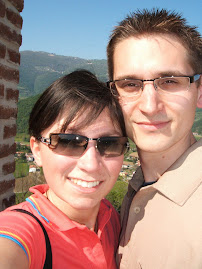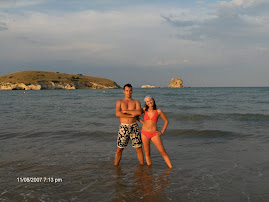venerdì 28 dicembre 2007
giovedì 20 dicembre 2007
domenica 9 dicembre 2007
Map your mind
Hi everybody!
Today I'm going to show you how my PLE (Personal Learning Environment) is structured, and so how my mind functions (or try to). To do that, I based my reflections on the definition, given by Martin, which doesn't limit to technologies, but offers a generic definition which includes anything can help us to learn: “a combination of the formal and informal tools and processes we use to gather information, reflect on it and do something with it, which is essentially what we mean when we talk about learning”.
After reflecting a while about my way of learning languages I chose to organize my PLE in these 4 points ( here you can see my PLE's map):
1- Gathering information: I can collect new information in a wide number of situations both formal (school courses with teachers, exercises and books) and informal (listening to songs, surfing the Net, traveling). During this course, we got to know some new tools, such as Bloglines, del.icio.us and podcasts, which can help our informal learning surfing the Net; this will be very useful in our "after-degree life", because we won't be attending lessons any more and the Net will be the primary way we'll have to practice our English and learn something new.
Furthermore, in my life is going to appear another important source of new information, which is both formal and informal: the Erasmus experience! From January to June I'm going to live "immersed"in English culture and language: in addition to the formal English courses I'm going to attend, I'll be "forced" to speak English in every moment in order to "survive":-)
I'm convinced that this experience will be very useful and my English will take a great advantage from it! I'm looking forward to leave!
2- Reflecting and exchanging information: Once I've gathered a new piece of information, I can share it with people around me ( e.g. my peers, my friends, people in general) and the best tool to do that is my blog. In it, I can write what I learned and people can comment on it, so, discussing and exchanging opinions, I increase my knowledges.
3- Using information: I think the information I gather are useless if I don't find how to use them in my daily life. Only in this way, they become deeply mine and play an active role to my cultural and personal growth.
4- How : I can learn something new about a language in many ways. For example, I can listen to a conversation, to a TV program or to a song; I can improve my skills writing either on my blog or some e-mails to a foreign University; surely, speaking with a native English (or Spanish or French or German) speaker is very useful to learn colloquial expressions and improve my fluency, which is always one of my weakest points. Finally I think that one of the best ways to learn is making mistakes and, obviously, try to correct them.
Bye!
After reflecting a while about my way of learning languages I chose to organize my PLE in these 4 points ( here you can see my PLE's map):
1- Gathering information: I can collect new information in a wide number of situations both formal (school courses with teachers, exercises and books) and informal (listening to songs, surfing the Net, traveling). During this course, we got to know some new tools, such as Bloglines, del.icio.us and podcasts, which can help our informal learning surfing the Net; this will be very useful in our "after-degree life", because we won't be attending lessons any more and the Net will be the primary way we'll have to practice our English and learn something new.
Furthermore, in my life is going to appear another important source of new information, which is both formal and informal: the Erasmus experience! From January to June I'm going to live "immersed"in English culture and language: in addition to the formal English courses I'm going to attend, I'll be "forced" to speak English in every moment in order to "survive":-)
I'm convinced that this experience will be very useful and my English will take a great advantage from it! I'm looking forward to leave!
2- Reflecting and exchanging information: Once I've gathered a new piece of information, I can share it with people around me ( e.g. my peers, my friends, people in general) and the best tool to do that is my blog. In it, I can write what I learned and people can comment on it, so, discussing and exchanging opinions, I increase my knowledges.
3- Using information: I think the information I gather are useless if I don't find how to use them in my daily life. Only in this way, they become deeply mine and play an active role to my cultural and personal growth.
4- How : I can learn something new about a language in many ways. For example, I can listen to a conversation, to a TV program or to a song; I can improve my skills writing either on my blog or some e-mails to a foreign University; surely, speaking with a native English (or Spanish or French or German) speaker is very useful to learn colloquial expressions and improve my fluency, which is always one of my weakest points. Finally I think that one of the best ways to learn is making mistakes and, obviously, try to correct them.
Bye!
domenica 2 dicembre 2007
The importance of being critical
picture from Google images
 Hi Girls!
Hi Girls!
this week Sarah asked us to do something less practical but not less important at all: reflecting about the criteria we use when we have to select among the huge amount of information the web can offer.
Before looking at the websites she suggested, I tried to think to what I usually do to evaluate the reliability of a source. First of all, I judge the layout of the page; even if it can seem a superficial operation, I think the aspect can tell lots of things: from it you can see if it is an "official" site or just a personal page where one simply expresses their opinion; then, if the page is not well organized and confusing, reading and finding useful information become difficult and very time demanding so often is not worth to waste time.
After watching the layout, I try to evaluate the content, in particular the tone and the register: obviously, the more formal they are, the more reliable I consider the source.
But, when I read through the links Sarah put in the post, I realized that my "being critical" was not so complete. :-(
In effect there are many more aspects to be considered. I completely agree with the article of the Purdue’s Online Writing Lab (OWL) when it says "It's been called an art as well as work--much of which is detective work. You have to decide where to look, what clues to search for, and what to accept." As a matter of fact, you have to pay attention to a lot of details in order to judge the source in the most correct way: the first part of the website address, from which you can see if the source is to be trusted; checking if the author is mentioned clearly and with some addresses; look at the date of the last updating; try to understand which is the aim of the article (convince, inform, express a partial point of view).
In order to make this process of selection easier, many sites give the fundamental questions one has to ask him/herself. They are more or less the same, but I found particularly interesting and clear the indications of the Cornell University Library .
I think that all these pieces of advice will be very useful to my thesis work in order not to put unreliable or even false information. It could be a bit time demanding, but it is worth!
this week Sarah asked us to do something less practical but not less important at all: reflecting about the criteria we use when we have to select among the huge amount of information the web can offer.
Before looking at the websites she suggested, I tried to think to what I usually do to evaluate the reliability of a source. First of all, I judge the layout of the page; even if it can seem a superficial operation, I think the aspect can tell lots of things: from it you can see if it is an "official" site or just a personal page where one simply expresses their opinion; then, if the page is not well organized and confusing, reading and finding useful information become difficult and very time demanding so often is not worth to waste time.
After watching the layout, I try to evaluate the content, in particular the tone and the register: obviously, the more formal they are, the more reliable I consider the source.
But, when I read through the links Sarah put in the post, I realized that my "being critical" was not so complete. :-(
In effect there are many more aspects to be considered. I completely agree with the article of the Purdue’s Online Writing Lab (OWL) when it says "It's been called an art as well as work--much of which is detective work. You have to decide where to look, what clues to search for, and what to accept." As a matter of fact, you have to pay attention to a lot of details in order to judge the source in the most correct way: the first part of the website address, from which you can see if the source is to be trusted; checking if the author is mentioned clearly and with some addresses; look at the date of the last updating; try to understand which is the aim of the article (convince, inform, express a partial point of view).
In order to make this process of selection easier, many sites give the fundamental questions one has to ask him/herself. They are more or less the same, but I found particularly interesting and clear the indications of the Cornell University Library .
I think that all these pieces of advice will be very useful to my thesis work in order not to put unreliable or even false information. It could be a bit time demanding, but it is worth!
Sorry!!!
Sorry Sorry Sorry my peers!
I've just realized that the task timeline for e-tivity 8 was last Friday. I don't know why, but I thought it was today!
Sorry!
Iscriviti a:
Commenti (Atom)










